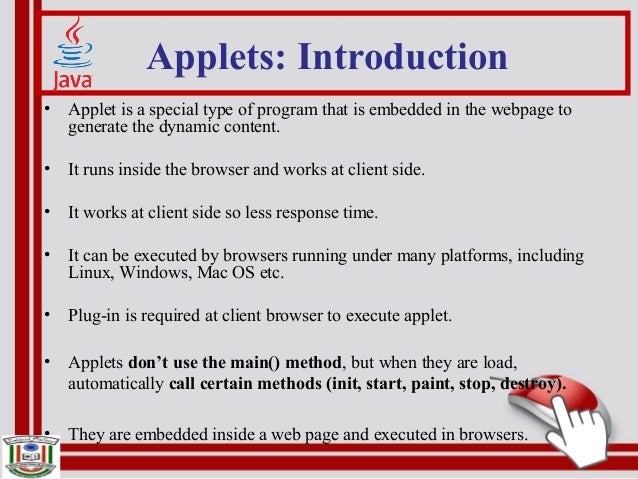- A: If you have not yet installed Apple's Java Mac OS X 2012-006 update, then you are still using a version of Apple Java 6 that includes the plug-in and the Java Preferences app. See Note for Users of Macs that Include Apple Java 6 Plug-in.
- Is there a reason why one Posting is 'Apple Java for OS X Lion 2012-001' and the other is 'Apple Java for Mac OS X 10.6 Update 7.' One is the OS Number, the other is the catchy name (like 'Lion.'
Last updated: January 16, 2019

Update: Please see our Java Support in Safari 12 article for the latest information on Java support in Safari on macOS. The option to allow plug-ins described below is no longer supported by Safari.
No matter which web browser you use on your computer, you will need the Java plug-in from Oracle in order to view content that uses Java, such as Java applets. The Safari web browser on Mac from Apple is no exception. Java applets are common on the Internet. It is important, therefore, to know how to enable and disable Java in Safari on Mac if it is your web browser of choice.
To modify a component, move the mouse over it, click the right mouse button (or control-click if you have a Mac) and select “Edit”. The 'Circuits' menu contains a lot of sample circuits for you to try. Full Screen version. Standalone (offline) versions. Index of Circuit Examples. (Polish version) More applets. Javascript version. To have Java Applets for MAC OS, you must have a latest version of Java. Here’s the link to download it. Go to Java Preferences application and toggle setting to 'Run applets in their own process' then restart your desktop and try to view the Java Applets.
First, please be certain the version of Java on your computer is current. Once you have verified Java is installed on your computer, please follow the instructions below to learn how to enable or disable Java in Safari on Mac.
1. Launch the Safari application, and click the Safari file menu. Select Preferences from the drop-down menu.
Java Applet Examples
2. The Preferences dialog will launch in a new window. Click the Security icon.
To enable Internet plug-ins, including Java, to load in Safari, check the Internet Plugins: Allow Plug-ins check box. Unlike Safari on Windows, there is no individual check box for Enable Java for Safari on Mac.
3. When you encounter Java content in Safari, Safari will block the content from loading. You will see a notification in the browser window where the Java content would otherwise load:
4. Click the right-arrow in the notification. A Do you want to trust the website… dialog will display.
In this case, we visited the Java.com web site to load a test Java applet. Since we trust the web site, we clicked the Trust button to allow java.com to use the Java plug-in. When we re-visit the Java content on this web site, the Java content will now display.
5. You can manage your trusted web sites, and choose degrees of trust, by returning to the Security settings of Safari’s Preferences window. Adjacent to the Internet Plugins: Allow Plug-ins check box, click the Website Settings… button.
A new dialog will launch. The dialog displays all of the Internet plug-ins currently installed. To manage the web sites you have trusted to use the Java plug-in, click Java in the left navigation pane. The list of web sites you have already trusted will display.
Use the pull-down menu adjacent to the web site in the list to choose a level of trust you want to extend to this site. You may choose from Ask, Block, Allow or Allow Always (or Run In Unsafe Mode). You may delete a web site from this list by highlighting it with your mouse, and clicking the minus button at the bottom of the list.

Thank you for visiting Tech Help Knowledgebase to learn how to enable and disable Java in Safari on Mac.
Tech Help Knowledgebase creates how-to articles and video tutorials for common issues, and provides technical support for the categories covered by our site.
Get Support.
For the protection of our customers, Apple does not disclose, discuss, or confirm security issues until a full investigation has occurred and any necessary patches or releases are available. To learn more about Apple Product Security, see the Apple Product Security website.
For information about the Apple Product Security PGP Key, see 'How to use the Apple Product Security PGP Key.'
Where possible, CVE IDs are used to reference the vulnerabilities for further information.
Install Java Applet
To learn about other Security Updates, see 'Apple Security Updates.'
Java for Mac OS X 10.6 Update 2
Java
CVE-ID: CVE-2009-1105, CVE-2009-3555, CVE-2009-3910, CVE-2010-0082, CVE-2010-0084, CVE-2010-0085, CVE-2010-0087, CVE-2010-0088, CVE-2010-0089, CVE-2010-0090, CVE-2010-0091, CVE-2010-0092, CVE-2010-0093, CVE-2010-0094, CVE-2010-0095, CVE-2010-0837, CVE-2010-0838, CVE-2010-0840, CVE-2010-0841, CVE-2010-0842, CVE-2010-0843, CVE-2010-0844, CVE-2010-0846, CVE-2010-0847, CVE-2010-0848, CVE-2010-0849, CVE-2010-0886, CVE-2010-0887
Available for: Mac OS X v10.6.3, Mac OS X Server v10.6.3
Impact: Multiple vulnerabilities in Java 1.6.0_17
Description: Multiple vulnerabilities exist in Java 1.6.0_17, the most serious of which may allow an untrusted Java applet to execute arbitrary code outside the Java sandbox. Visiting a web page containing a maliciously crafted untrusted Java applet may lead to arbitrary code execution with the privileges of the current user. These issues are addressed by updating to Java version 1.6.0_20. Further information is available via the Sun Java website at http://www.oracle.com/technetwork/java/javase/releasenotes-136954.html
Applet Java For Mac Os High Sierra

Java Applet Tutorial
Java
CVE-ID: CVE-2010-0538
Available for: Mac OS X v10.6.3, Mac OS X Server v10.6.3
Impact: Visiting a web page containing a maliciously crafted untrusted Java applet may lead to an unexpected application termination or arbitrary code execution with the privileges of the current user
Description: An out of bounds memory access issue exists in the handling of mediaLibImage objects. Visiting a web page containing a maliciously crafted untrusted Java applet may lead to an unexpected application termination or arbitrary code execution with the privileges of the current user. This issue is addressed by preventing Java applets from using the com.sun.medialib.mlib package. This issue only affects the Mac OS X implementation of Java. Credit to Marc Schoenefeld of University of Bamberg for reporting this issue.

Java Applets Chrome
Java
CVE-ID: CVE-2010-0539
Available for: Mac OS X v10.6.3, Mac OS X Server v10.6.3
Impact: Visiting a web page containing a maliciously crafted untrusted Java applet may lead to an unexpected application termination or arbitrary code execution with the privileges of the current user
Description: A signedness issue exists in the handling of window drawing. Visiting a web page containing a maliciously crafted untrusted Java applet may lead to an unexpected application termination or arbitrary code execution with the privileges of the current user. This issue is addressed through improved bounds checking. This issue only affects the Mac OS X implementation of Java. Credit to Jonathan Bringhurst of Northrop Grumman, and Jeffrey Czerniak for reporting this issue.
